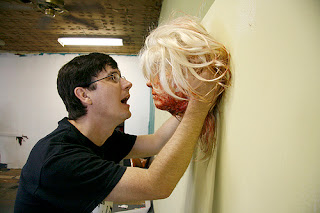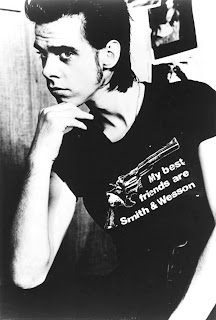Save your breath, I never was one!
You don't know what I'm all about,
like killing cops and reading Kerouac"
--Jawbreaker, "Boxcar"
Up at the top of this blog, there's a mission statement that says "punk-rock literary criticism." And I wanna talk about that now. I could talk about the critics who inspire me (Marx, Koestler, Foucault, Said, Zizeck, Bakhtin, Butler, Fish), but I know what you're thinking: "another blog about Mikhail Bakhtin's theory of the groteqsue and Foucault's theories of power and authority? Like that's never been done before!" Also, it would be hard work. So let's talk about the punk thing instead.
If you've read, like, any of this blog, you may have noticed that music is kind of a big deal in what I do. It's usually in the background, but the essential premise of this thing I write is "dude, the literary canon is pretty punk rock." So I was hoping we could talk about that some. Yeah. Let's talk about how much we love rock and roll. We're cool kids. Awesome.
Anyway, all posturing aside, these are 5 bands who I think really represent what the mission statement of this blog is. If you've got any of their stuff, this is what I'd recommend as the best accompaniment to my various rambles and discussions. Also, I'm not finished with Didion's Democracy yet, which is why I'm doing kind of a fluff piece.
 |
| Wow, it's like if Chuck Klosterman was even less of a real journalist! |
Jawbreaker
I've been told that there are two kinds of relationships people have with Jawbreaker: there are people who don't like them and there are people who want tattoos of their lyrics. They're a band with a...devoted following, to say the least.
My friend Stephen (whose Jawbreaker tattoo is from the chorus of "Jet Black") got me listening to them while we were talking about music in our Intro to Poetry class-- I burned him a copy of Sunset Rubdown's Shut Up I Am Dreaming, he burned me a copy of 24 Hour Revenge Therapy (which I've been listening to, on average, once a day for the past month). And while I would never pretend to be as hardcore about this band as a lot of its fans are, that album's pretty much come to embody a lot of what I want to do with this blog. Which is to say, it's vicious early-90's punk rock about Anne Sexton poems.
 |
| Play Sexton's reading of "Her Kind" over this image and you'll pretty much figure out my entire goal in life. |
"Climbed out on to my roof.They're a band that shows that not only is it possible to keep that riotous, angry edge while getting excited about fifty-year-old literature, but that if you don't you're probably not reading it right. If I get this blog to just play the "ONE TWO THREE FOUR WHO'S PUNK WHAT'S THE SCORE" from "Boxcar" every time you opened it I could probably make every entry about half as long.
So I'd be a poet in the night.
Beat the walls off my room.
I saw the big room that is this life.
This is my condition:
Naked and hysterical,
reaching to grab a hand that I just slapped back at."
Besides, if "Ache" doesn't describe the way you've spent at least a year of your life, then I don't know what you're doing reading literature in the first place.
The Smiths
I love to read and I spend a lot of time being sad, by which it follows, with the inevitably of a mathematical proof, that I loved the Smiths when I was in High School. I probably don't even need this entry here, you can fill it in yourself.
I don't listen to them nearly as much as I did when I was seventeen (which doesn't say much, as I'm pretty sure that Morrissey never listened to as much Smiths as I did when I was seventeen), but I owe a ton of my worldview to them. Which, yes, is part of why I'm kind of a prick. But the way Morrissey combined sneering intellectualism with New York Punk apathetic radicalism, the sorry clutching-together of voiceless outcasts, and constant, frighteningly dark witty self-deprecation... I'm not saying that I try to be like him, but you can definitely see his shadow over the writing I do here.
 |
| His creepy, weird-haired shadow. |
Seriously, just picture me with an awful haircut and a Bauhaus t-shirt, reading Oranges Are Not the Only Fruit, listening to Suedehead and weeping softly. What you're seeing is basically the formative moments of the man I am now. Also, I don't know why you'd want to picture that, it is an ugly scene.
Leonard Cohen
If I could write poetry like anyone, it would be Leonard Cohen. The man's poetry is incredible, his song lyrics equally so, and the guy's voice... well, I wouldn't want him to sing at my wedding, but I wouldn't want anyone else to sing "Lover Lover Lover" either.
If The Smiths were the main influence on the way I viewed language and art in high school, Cohen's the guy who did it all through college. When I was 18 I went out and bought the last CDs I would get in high school: In Utero and Songs of Leonard Cohen. I wrote my entire college senior thesis listening almost exclusively to his best, most complex and beautiful album, New Skin for the Old Ceremony.
 |
| Wow, he smoked? I never would have guessed. |
If you've never listened to New Skin For the Old Ceremony, definitely pick it up. It's not his best-known (the only notable "hit" is "Chelsea Hotel No. 2") but, out of everything the man did, it's his most Cohen-y. It's full to the brim, if not overflowing, with sexual pathos, religious frustration and wonderment, and political exhaustion, and the man's voice is gorgeous: barely supported by the rickety music, frail and cracking, exhausted and bitter. It's one my favorite albums to write to, and anything you read on this blog has at least a %10 chance of being composed while it was playing in the background.
 |
| Definitely not kidding about the sex thing. Leonard Cohen is going to tell you about his penis. |
Field Commander Cohen: thanks for being smart, miserable, sexy, bleak,
resentful of God, and giving me a dream of one day being like you.
The Mountain GoatsOkay, I know you all were just waiting for this one to pop up. Darnielle's my favorite musician and my favorite songwriter, and an all-around great guy. When I met him, I told him that All Hail West Texas and The Sunset Tree kept me alive through my mid-to-late teenage years and the guy gave me a hug and said that, quote "you have no fucking idea how proud it makes me to hear that."
Unlike the other four on this list, the man's actually contributed pretty heavily to this blog: I definitely tend to seek out the writers he references (Jean Valentine, Joan Didion, Merce Roderada, Samuel Butler), and he actually did me a pretty solid favor. Google "Death In Spring Review." Yeah. I'm at the number one spot because of his endorsement of that article. So thanks, John. You did me a solid.
 |
| Thank for taking time out from your busy schedule of necromancy and baking. |
Said approach is: claw your way through your dreams, sink your teeth into the things you love, and try to treat your passions with as much zeal and fire as you can. And I think that every time I've come on here and written something along the lines of "oh my god, you guys, T.S. Eliot will rock your freakin world, let me tell you how and let me demonstrate it by also telling you to listen to this Swedish black metal song" I'm pretty much approaching art in the same way that The Mountain Goats do. Only not as well.
 |
| And without the stylish accessories. |
The StoogesMy dad, being, you know, a dad, has this infuriating tendency to refer to any music I like that has any amount of distortion or is too loud as grunge. Canadian indie-rock? Grunge. New York punk from the 70's? Grunge. Death metal? Grunge. Lo-fi folk music? Somehow, inexplicably, grunge. Somehow he's gotten it into his head that I am a Seattle teenager from 1992. It is the worst thing. Literally the only grunge record I own is In Utero.
The point of this is that music has genres and tones and these genre classifications are important to people-- I spent a pretty good chunk of my life with that early-70's, dirty-as-hell American punk sound being essentially the noise of my heartbeat and the whine of my nerves, and that's why I can still feel confident calling myself punk rock even though I wear a lot of sweaters and blazers and one of my favorite pieces of music is Shostakovich's Piano and Cello Sonata in D Minor and the cult film actor I most resemble is Philip Seymour Hoffman. In The Big Lebowski.
 |
| "These are my Velvet Underground records. And proud we are of every one of them, Dude." |
Iggy Pop's favorite writer is Dostoevsky. That's a stone-cold fact. "Search and Destroy" was him trying to write a rock song about feeling like Raskolnikov. Fun House is pretty much an encapsulation of what it felt to be The Underground Man in a trailer park outside Detroit in 1970. The Idiot is named after the masterpiece of a novel, and how being good is stupid and pointless in this ugly, cruel world but how we should never, ever give up on it. The Stooges make dumb, ugly, sleazy rock that's also a beautiful expression of classic literary ideas and some of the most powerful art of the 20th century.
 |
| Ranking right between Les Trois Mademoiselles D'Avignon and Rauschenberg's The Bed. |
In the liner notes for the reissue of Fun House, Jack White wrote (and I'm paraphrasing, because my CDs are in storage right now) that it's an album that, if you hear it at the right time in your life, shakes something loose inside you that never goes back to where it's supposed to be. The Stooges, and other bands under the banner of what they represent to me (The Ramones, The Clash, Richard Hell, Black Sabbath, Motorhead, Marduk), shook that part loose and it's still rattling today. And that part (which, to use Baudelaire's use of the term, is probably the spleen) is what does most of the writing here.
And that's why I'm still totally punk rock.
Honorable Mention: Nick Cave
 |
| Jesus, he's a scary man. |
It is a bitchingly awesome song, and it's the best critical interpretation of Milton's god any critic's ever done. So thanks, Nick Cave, for giving us punk rock that is simultaneously some really insightful literary criticism.
This article is split 50/50 between bands I love, i.e. the stooges, the mountain goats, and the smiths, and bands I will check out the minute I am done posting this.
ReplyDelete